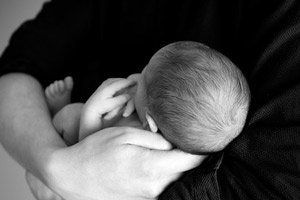
All iLive content is medically reviewed or fact checked to ensure as much factual accuracy as possible.
We have strict sourcing guidelines and only link to reputable media sites, academic research institutions and, whenever possible, medically peer reviewed studies. Note that the numbers in parentheses ([1], [2], etc.) are clickable links to these studies.
If you feel that any of our content is inaccurate, out-of-date, or otherwise questionable, please select it and press Ctrl + Enter.
Newborn baby: why did the temperature readings on the thermometer change?
Medical expert of the article
Last reviewed: 08.07.2025
 ">
">When a baby is born, one of the first manipulations that will be performed on him is measuring his body temperature. Normally, the thermometer readings will differ by 0.1-0.6 degrees from his mother's body temperature. And all because the temperature in the mother's belly is higher than outside. It will take literally 60 minutes for the newborn's body temperature to begin to fall. And in 2-4 hours it will reach its minimum marks.
A sharp drop in temperature is provoked by the immaturity of the newborn's thermoregulation system and the new conditions of the baby's existence, to which it still needs to adapt. Healthy babies do not lose more than 1.5-2.5º C, but premature babies or those born after severe intrauterine hypoxia can tolerate a "drop" to 35º and even 32º C. This condition poses a threat to life, so such babies are nursed in special incubators "under the hood".
After the temperature reaches its lowest values, it will begin to rise gradually, and in 12-24 hours it will reach 37º C. If the values have not risen to 36º C during this period of time, this signals weakened protective forces of the body. Such babies are subject to more thorough examination by specialists - neonatologists of Kyiv.
On the 3rd-4th day after birth, a phenomenon such as a sudden increase in temperature to 40º C is possible. This occurs mainly at night, lasts for 3-4 hours and passes without a trace. This condition is called "transient fever of newborns". The baby's health does not suffer, except that he may refuse to eat. At this time, the peak of the maximum physiological weight loss of the baby occurs (up to 10% of the initial weight from birth).
Pediatricians have noted that healthy children who lose less than 200 g of their initial weight almost never experience transient fever. But children who have lost from 500 to 720 g experience its symptoms in half of the cases. The explanation is simple: such children lose more fluid, and their first food - colostrum - contains a large amount of protein, which requires a sufficient amount of fluid for normal absorption by the body. A strong protein load provokes a rise in temperature. Sometimes it is enough to simply give such a child something to drink so that all indicators return to normal.
 [ 1 ]
[ 1 ]

